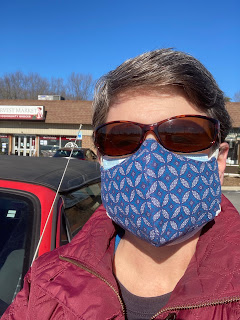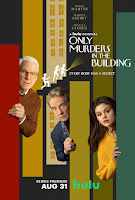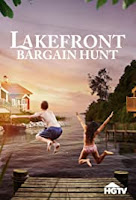On January 5 this year, I got COVID. Happy New Year! I got it from my 96-year-old father-in-law's nursing home, where they are still battling an outbreak. He also got it, and so did my 24-year-old son. Somehow, my husband escaped it, even though all three of us had been visiting my father-in-law every day (he broke his hip just before Christmas so had just moved to the care home). I was wearing my mask when I visited, but as a resident, he was not wearing a mask, mine was just fabric, and the day he was diagnosed, I had spent 90 minutes with him, including hugging him and kissing his forehead and feeding him. And this omicron variant is crazy contagious! My son got very sick, with the classic cough, congestion, and fatigue, but he is otherwise healthy (he's the one who had ME/CFS as a kid but recovered fully) and after a week, he was testing negative, feeling a lot better, and back to work. My father-in-law is also doing much better and is out of the COVID ward, though he is still bed-ridden from the broken hip and has moderate dementia. COVID definitely got in the way of physical therapy and his recovery. As for me, I have had ME/CFS for 20 years, so my story is more complicated:
COVID Vaccines in 2021
After much deliberation, consultations with my doctors, and lab tests, I did decide to get the two Moderna vaccines in May and June of 2021. I shared all of my research here, in a series of three blog posts:
ME/CFS and COVID-19 Vaccines - all about the immune dysfunction of ME/CFS, how vaccines work, and how they are likely to affect those with ME/CFS.
COVID Vaccine Experience of ME/CFS Patients - several resources for looking at COVID vaccine experience of those with ME/CFS and some of the data collected at that point, plus our own experiences.
Prep for ME/CFS Patients Getting a COVID Vaccine - where I review treatments I was already on to help normalize the immune system, treatments for MCAS that could help to ease or prevent an allergic reaction to the vaccine, and advice from experts.
I was already doing most of what the experts recommended, plus lots of treatments to normalize my immune system. I think I had a relatively mild response to the vaccine for someone with ME/CFS. It definitely affected me, maybe for several months, but not severely, as I have heard from other patients (most likely because of all the immune treatments I was already taking). You can read more about my own vaccine experiences (and my son's) in that Vaccine Experience post.
Getting COVID in January 2022
So, my father-in-law was diagnosed on January 2 (and I spent so much time with him that day because he was much more lethargic than normal and had no appetite). My son's symptoms began the next day, and he tested positive a couple of days later. My own symptoms began on January 5, and I also tested positive a few days later (which shows you just how much it can spread before you even know you have it!).
For the first two weeks, I was very, very sick. I had the typical chest congestion, sinus congestion, and cough. The biggest symptom, though, was complete exhaustion. I've been living with ME/CFS for 20 years and have been through plenty of bad crash days (including many in the early years), but this was fatigue on a whole other level! Some days, I could not stay awake - I just ate and slept.
People with ME/CFS are especially prone to bacterial infections (our dysfunctional immune systems don't fight very well against bacteria), and I had a long history (before immune treatments) of getting bacterial bronchitis, often 4-5 times a year! Knowing this--and luckily, my doctor understands it, too--that first morning when I woke up with my chest tight and a bit of chest congestion, I immediately asked my doctor for Zithromax, an antibiotic that works against bronchitis. As I said, and she agreed, even if it was COVID, the congestion would almost certainly lead to bronchitis for me. I'm so glad I did this! Given my past history, I think it is almost certain, I would have ended up with both COVID and bronchitis, which would have been much harder to recover from.
Gradually and very slowly, I began to see small signs of improvement after two weeks: fewer days of sleeping all day; being able to sort of sit up on the couch, propped on pillows; less congestion. In this past week, I have been able to resume my usual schedule of being productive from the couch or recliner in the morning, taking an after-lunch nap, and getting in another couple of productive hours in the late afternoon.
Interestingly, it took me longer than my son to finally test negative - about two weeks versus his one.
I am just past three weeks now, and the improvements have continued. I'm not coughing much anymore, though I still have a lot of excess mucus and need a cough drop before nap and bed. My post-exertional malaise (PEM, i.e. crashing after mild exertion) has been much, much worse with COVID but is beginning to improve. I have been managing a slow 15 minute walk after my nap most days, and I was able to go out in public and run a few easy errands this week. (Note that in past years, I have reduced PEM and improved my stamina by treating OI and treating immune dysfunction.)
 |
| Out in the world again! |
What's Ahead?
In that second week with COVID, when I was still so very sick that I could barely stay awake, I did start to worry that my ME/CFS could stay worse for a very long time, since COVID is a known trigger for ME/CFS (many cases of "long COVID" are ME/CFS). Although my recovery has been slow, I have now this past week seen steady signs of improvement, and I do think I will be able to get back to my "normal" baseline, which I had just returned to in December after a 20-month relapse!
During those dark days, I did a little informal poll on chronic illness Twitter (there's a great community there - find me @livewithmecfs). I just asked people with ME/CFS who got COVID, how long it took them to return to their normal baseline. I didn't add up the results, but some people answered anywhere from a month to nine months, some people said they still weren't back to baseline (after months or years), and just a very few said they were better than before they had COVID! As with everything else with ME/CFS, we are all different!
I do think that all that work I did in the past 20 months to recover from my March 2020 relapse, plus the treatments I had started before that, certainly have helped me. I'll work on a separate post about what I did to recover from that relapse, but in the meantime, you can see a summary of the treatments for ME/CFS that have most helped my son and I.
Please see my follow-up post, What To Do If You Get COVID, for more information on how to treat COVID to prevent serious complications and some other preliminary things you can do, with ME/CFS, to lessen the impact. All of this information is also applicable to those with long-COVID.
What About You?
Please share your own experiences in the Comments (please let me know on Twitter or Facebook if you are unable to leave a comment).
Have you had COVID? How bad was it? Have you recovered back to your normal baseline yet?


















